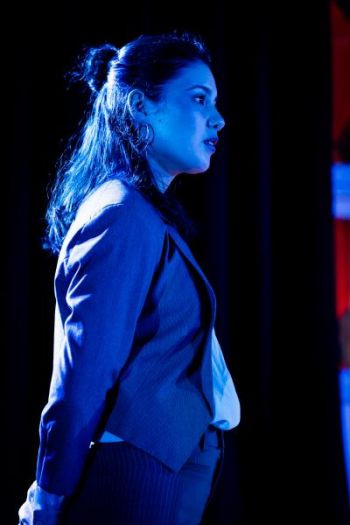Cymbeline (Or, Imogen)
The rarely performed Cymbeline is a melodrama – a tale of treachery, betrayal, sibling rivalry, deception, revenge, guilt and innocence, love, loyalty and forgiveness, murder, misogyny, peerless virtue, cross-dressing, and rapid movement – and warfare - between ancient Britain and Rome. Some have called it a comedy. Others a romance. (There are elements of both.) It has been loved by some and derided by others. Dr Samuel Johnson remarked that, ‘This play has many just sentiments, some natural dialogues, and some pleasing scenes, but they are obtained at the expense of much incongruity… the folly of the fiction, the absurdity of the conduct…and the impossibility of the events…’
 The great virtue of this production of this contentious play is that director Robert Johnson and his cast make it almost plausible, but chiefly comprehensible. That may sound like damning with faint praise. Not at all. With unflagging energy and a very high standard of performance, they take the convoluted, sometimes verging-on-ridiculous plot, create characters about whom we care, and give it that essential ingredient: making us care what happens next.
The great virtue of this production of this contentious play is that director Robert Johnson and his cast make it almost plausible, but chiefly comprehensible. That may sound like damning with faint praise. Not at all. With unflagging energy and a very high standard of performance, they take the convoluted, sometimes verging-on-ridiculous plot, create characters about whom we care, and give it that essential ingredient: making us care what happens next.
And they do it with Shakespeare’s text and, otherwise, a minimum of means. There is no shrinking from ‘poetic dialogue’: this cast give it full throat and full throttle. There is some doubling up (unsurprising given that there are over fifteen speaking parts), but little confusion. It may be risky for Alexander Tomisich to play both Posthumus, the romantic lover, and Cloten, his villainous rival, but it comes off. Elisa Armstrong, it must be said, as Imogen, our much put upon heroine, rises rather far above the rest in subtlety, dignity, and a quietly magnificent, riveting stage presence, but that too is fitting given that Imogen is the lynchpin of the story.
A nice touch, given that they later turn out to be princes, is that the boys Guiderius/Polydore (Fletcher von Arx) and Arvirargus/Cadwal (Luke Hill-Smith), kidnapped as babes and brought up in a cave (it’s that kind of play), behave like oafish teenagers with a lot of nosy horseplay. That is, until they fall under Imogen’s spell – while she is pretending to be a boy named Fidele…

The theatre at Collingwood Yards is not really a theatre at all; it’s a small-ish room with a low dais for a stage, the audience on three sides. The only prop is a wooden chest and a toy model cave. Cast, when not on stage, sit in the front rows of the audience. There are no more than gestures toward costume: King Cymbeline (Alec Gilbert), a bit of a duffer, wears a business suit and a crown; his nefarious Queen (Alys Daroy) a short pencil skirt and high heels. Imogen, Cymbeline’s wayward daughter, is in jeans and a sweatshirt, and her lover Posthumus much the same. Later, when war breaks out, there is some camouflage gear, but that’s about it.
For a no frills play that runs here in two seventy-minute parts, it is engaging and entertaining – at times funny (in its silliness), at other times touching and moving. Before it begins, Alexander Tomisich invites audience participation – that we cheer, boo, hiss and applaud. Somehow, we mostly don’t: it’s not that much of a pantomime.
Michael Brindley
Subscribe to our E-Newsletter, buy our latest print edition or find a Performing Arts book at Book Nook.

